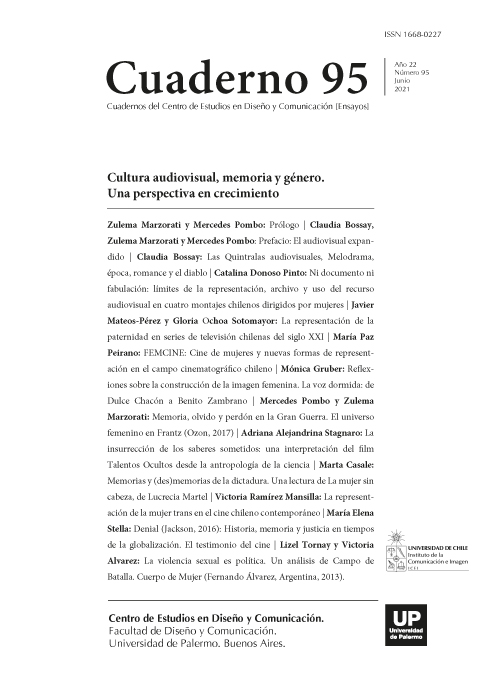Memoria, olvido y perdón en la Gran Guerra. El universo femenino en Frantz (Ozon, 2017)
Abstract
The actual paper intends to analyze the film Frantz pointing the woman´s changes along History.The story in both, a German and French context at the end of First World War, shows the war consequences due to young men´s death; familiar tragedies and desolation, destroying the reliability that Europeans had had in their own civilization until then. With an antibelicist discourse, the filmical text reminds that time of desolation and unreliability through three central characters: Frantz, a German dead in trenches¸ Anna, his girl-friend and Adrien, a French who introduces himself as Frantz´s friend before war.
As History can´t be unfastened from discourses and images that represent it, the aim in our paper is to board memory construction (and forgetfulness risks) about the consequences of The Great World War, at the same time it inquieries about feminine perspective in this context. De Beauvoir thinks that it´s posible to infer that characteristics inherent to women don´t come from nature but as a social complex process. Women take characteristics considered as feminine through a procedure that makes them as the opposite face of the masculine aspect. In the film we can clearly analyze these roles and how in the lapse of the story these borders are being out of perspective to give place to new paradigms. Ozon centralizes it in Anna, feminine figure, who from a simple spectator that waits and suffers her beloved´s lost, turns into in an active woman along the story. It´s through her view that the director reflects about the absurdity of war, the forgiveness and reconciliation, the art as escape from horror, and in particular the search of woman´s freedom in a patriarcal society
References
Briggs, A., Clavin, P. (1997). Historia Contemporánea de Europa. 1789-1989, Barcelona: Crítica
García Brusco, Carlos (1988). Ernst Lubitsch. Madrid: Ediciones JC. Colección Directores de Cine. Número 31
de Beauvoir, Simone (1987) El segundo sexo. Los hechos y los mitos. Buenos Aires: Editorial Siglo Veinte.
Duby, Georges (1989). Prefacio a la Historia de la vida privada. En P. Ariés y G. Duby (Comp.) Historia de la vida privada. Imperio romano y antigüedad tardía. Madrid: Taurus, tomo 1, pp.9-11
Fusi Aizpurúa, J.P. (1991) “La crisis de la conciencia europea” (cap. 12) en Cabrera, M., Juliá,S., y Aceña, P.M. (comps.), Euroa en crisis. Madrid: Editorial Pablo Iglesias
Kershaw, Ian (1999). Hitler. Barcelona: Ediciones Península
Price, Roger (1996). Historia de Francia. Gran Bretaña: Cambridge University Press
Woolf, V. (2008) Una habitación propia. Barcelona: Editorial Seix Barral
Los autores/as que publiquen en esta revista ceden los derechos de autor y de publicación a "Cuadernos del Centro de Estudios de Diseño y Comunicación", Aceptando el registro de su trabajo bajo una licencia de atribución de Creative Commons, que permite a terceros utilizar lo publicado siempre que de el crédito pertinente a los autores y a esta revista.


